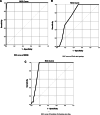The impact of cognitive function and depression on postoperative delirium risk in elderly patients undergoing major abdominal surgery
- PMID: 40660504
- PMCID: PMC12263022
- DOI: 10.1097/MD.0000000000043376
The impact of cognitive function and depression on postoperative delirium risk in elderly patients undergoing major abdominal surgery
Abstract
Postoperative delirium (POD) is a frequent neuropsychiatric disorder characterized by sudden onset, particularly in elderly patients. The aim of this study is to assess the relationship between cognitive function, depression status, and the risk of POD in geriatric patients undergoing major abdominal surgery. This prospective cohort study included 100 patients aged 65 years and older who underwent major abdominal surgery. Preoperatively and postoperatively, patients underwent cognitive assessments using the mini-mental state examination (MMSE), geriatric depression scale (GDS), three-word recall test, and clock drawing test. Demographic data and test results were subsequently analyzed statistically. The mean age of the participants was 70.8 ± 5.9 years. POD occurred in 18% of patients. Statistically significant differences were observed between preoperative and postoperative values for MMSE, GDS, and clock drawing test (P < .001). Postoperative GDS results showed a significantly lower rate of normal results in the delirium group (16.7%) compared to the non-delirium group (52.4%) (P = .021). Each 1-unit decrease in preoperative MMSE score was associated with an approximately 10-fold increase in the risk of delirium (OR: 9.7; 95% CI: 1.3-71.4). In conclusion, major abdominal surgery can increase depression and impair cognitive function in elderly individuals. POD is a common complication in the elderly, with significant health consequences. The MMSE may be a useful tool for predicting the risk of postoperative delirium.
Keywords: cognitive function; depression; major abdominal surgery; postoperative delirium.
Copyright © 2025 the Author(s). Published by Wolters Kluwer Health, Inc.
Conflict of interest statement
The authors have no funding and conflicts of interest to disclose.
Figures


Similar articles
-
A retrospective study on the relationship between delirium and long-term cognitive function in elderly women following cervical cancer surgery.Medicine (Baltimore). 2025 May 23;104(21):e42120. doi: 10.1097/MD.0000000000042120. Medicine (Baltimore). 2025. PMID: 40419912 Free PMC article.
-
Intravenous versus inhalational maintenance of anaesthesia for postoperative cognitive outcomes in elderly people undergoing non-cardiac surgery.Cochrane Database Syst Rev. 2018 Aug 21;8(8):CD012317. doi: 10.1002/14651858.CD012317.pub2. Cochrane Database Syst Rev. 2018. PMID: 30129968 Free PMC article.
-
Preoperative Prognostic Nutritional Index Is a Predictive Factor for Postoperative Delirium in Elderly Patients with Femoral Neck Fracture.Clin Interv Aging. 2025 Jul 2;20:941-950. doi: 10.2147/CIA.S518366. eCollection 2025. Clin Interv Aging. 2025. PMID: 40621090 Free PMC article.
-
Perioperative risk factors for postoperative delirium after hemiarthroplasty in geriatric hip fractures: A prospective observational study.Medicine (Baltimore). 2025 May 23;104(21):e42025. doi: 10.1097/MD.0000000000042025. Medicine (Baltimore). 2025. PMID: 40419921 Free PMC article.
-
Associated factors for postoperative delirium following major abdominal surgery: A systematic review and meta-analysis.Int J Geriatr Psychiatry. 2023 Jun;38(6):e5942. doi: 10.1002/gps.5942. Int J Geriatr Psychiatry. 2023. PMID: 37260053
References
-
- Wei W, Zhang A, Liu L, et al. Effects of subanaesthetic S-ketamine on postoperative delirium and cognitive function in elderly patients undergoing non-cardiac thoracic surgery: a protocol for a randomised, double-blinded, placebo-controlled and positive-controlled, non-inferiority trial (SKED trial). BMJ Open. 2022;12:e061535. - PMC - PubMed
-
- Wang Y, Lei L, Ji M, Tong J, Zhou CM, Yang JJ. Predicting postoperative delirium after microvascular decompression surgery with machine learning. J Clin Anesth. 2020;66:109896. - PubMed
Publication types
MeSH terms
LinkOut - more resources
Full Text Sources
Medical

